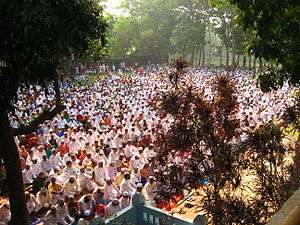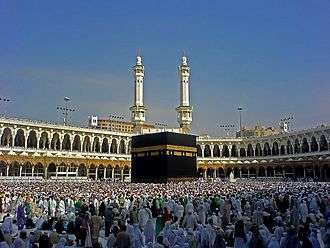Khutbah
| Part of a series on |
| Islam |
|---|
 |
|
Related topics |
|
Khutbah (Arabic: خطبة khuṭbah, Turkish: hutbe) serves as the primary formal occasion for public preaching in the Islamic tradition.
Such sermons occur regularly, as prescribed by the teachings of all legal schools. The Islamic tradition can be formally at the dhuhr (noon) congregation prayer on Friday. In addition, similar sermons are called for on the two festival days.
Origins and definition
Religious narration (including sermons) may be pronounced in a variety of settings and at various times. The khutbah, however, refers to khutbat al-jum'a, usually meaning the address delivered in the mosque at weekly (usually Friday) and annual rituals. Other religious oratory and occasions of preaching are described as dars (a lesson) or waz (an admonition), and their formats differ accordingly.[1]
The khutbah originates from the practice of the Islamic prophet, Muhammad, who used to deliver words of exhortation, instruction, or command at gatherings for worship in the mosque, which consisted of the courtyard of his house in Medina. Though khutba isn't mentioned directly in the Qur'an, one passage uses the word "khutubah" when referring to Qit'aal. (Al-Baqara:216)
After the conquest of Mecca, Muhammad presented himself as a khatib to the city in AD 630. The first four caliphs, and the Ummayads caliphs and provincial governors all delivered sermons. There were not necessarily exhortatory, but addressed practical questions of government and sometimes even included direct orders. Under the Abbasids, the caliph himself no longer preached, but assigned the task to the religious judges. The Abbasids insisted they were clearing Islam of the secularism of the Umayads, and this probably helped in strengthening the religious aspect of the sermon.[2]
Delivery
At the beginning of the service the adhan is given, during which the khatib (the individual who delivers the khutbah) remains sitting. The iqama is given when the khatib descends. The sermon is delivered in two parts. Both parts are delivered while khatib is standing and punctuated by a pause in between them when the khatib sits down. During the sermon itself, it is obligatory to pronounce the following:[3]
- the hamdala, or an expression to praise God and show gratitude towards him; saying al-hamdu li'llāh "Praise belongs to Allāh" at the beginning of the sermon is usually sufficient,[4]
- the salawaat, or invocations of peace and blessings on Muhammad,
- recitation of a part of the Qur'an in the first part of the sermon or, according to some doctrines, in both,
- admonitions to piety in both parts of the sermon,
- and dua (prayer) on behalf of the faithful.
| “ | Make your salat (prayer) long and your khutba (sermon) short. | ” |
| — Islamic prophet Muhammad[5] | ||
The khatib must be in a state of ritual purity; his dress must be in accord with the prescriptions. It is commendable for the khatib to be on a pulpit or an elevated place; to salute the congregation when directing himself towards them; to sit down until the adhan is pronounced by the muezzin; and to direct himself straightway to his audience. Finally the khatib should make the sermon short.[3]
In medieval Islam, sermons were generally delivered in classical Arabic. This linguistic requirement that required substantial training on the part of the khatib, and a notable degree of education on the part of listeners, especially non-Arab Muslims. This expectation contributed to the growth of a literary genre consisting of model sermons, such as those by the renowned ibn Nubata (d. 984). Later on, however, preaching in colloquial languages, while often retaining certain Arabic expressions, has become increasingly common.[1]
Activities prohibited during the Khutbah
- Talking
- Offering Sunnat and Nafl salaat (permissible)
- Eating and drinking
- Reciting the Quran Shareef
Friday
One of the conditions for the validity of the Friday service is that it must be preceded by two sermons. The sermons are delivered when the number of auditors required for a valid j̲umu‘a are present.[3]
Traditionally, as instructed in classical Islamic legal treatises, Friday congregational prayers in which sermons were delivered were restricted to urban centers and normally to one major mosque in each city. Such a mosque is referred to as a masjid jami‘, that is, a "Friday Mosque" (or a "cathedral mosque"). These mosques were distinguished by their central location, large dimensions, monumental architecture, symbolic furnishings indicative of its exalted stature, and, the most demonstrative of all, the minbar (ritual pulpit).[1]
In contemporary times, Friday congregational prayers with sermons are common in mosques of all sizes and conditions, and not just restricted to a few central locations. sermons are also dispensed through newspapers and broadcast on radio and television.[1]
Special occasions

Sermons on special occasions generally contain features that are relevant to the celebrations (e.g. Eid) or the natural phenomena for which they are delivered (e.g. Kusuf and Khusuf). For instance, on Eid al-Fitr, the preacher has a duty to instruct the faithful congregation concerning the zakat, or almsgiving. On Eid al-Adha the preacher includes remarks specifying the rules for the sacrifice.[1]
There is a slight difference in the sermon delivered on Eid ul-Fitr. The sermon's first part must open with nine takbirs, the second part with seven. The sermon may also be pronounced while sitting. Regarding the sermons delivered during an eclipse or excessive drought, classical texts advise that such sermons must admonish the audience and ask God's forgiveness. Usually the verse 9 of Sūra LXVI is also recited and a special prayer called "Muḥammad's du'a"ʾ is said.[3]
One major difference between the sermon delivered on special occasions and that delivered every Friday is that in the former the sermon precedes the congregational prayer, while in the latter the congregational prayer comes first.[3]
Sovereign's name
In the pre-modern Middle East, the mention of a ruler's name in the sermon was one of the two prerogatives of sovereignty (the other being the right to mint coins). Mentioning meant accepting the sovereignty and suzerainty of a ruler, and it is considered the principle criterion of sovereignty for an Islamic ruler.[6] Omitting the name of a ruler from the sermon was like publicly declaring independence. This prerogative of sovereignty was introduced by Islam. It was not present in the pre-Islamic era. In addition, the sermon, a major vehicle of communication, also announced the deposition of a ruler, the accession of a ruler, nomination of an heir, and the beginning and end of a war.[7]
The sovereign's name was also declared in khutbas during the Mughal rule; Babur was styled 'Zahir-ud-Din Bábar Muhammad' during Friday khutbas.[8] Sher Khan, an adversary of the Mughal emperor Humayun, was content if Bengal was given to him in return of the emperor retaining his right to mint coins and proclaim the khutba in the emperor's name, and thereby becoming the "emperor's vassal".[9]
Khutbah and the Ministries of Islamic Affairs in modern states
In a number of countries like Turkey, the Gulf States, Saudi Arabia etc. there is a central religious authority supervised by the government which issues a weekly sermon to be read in all mosques under its jurisdiction. In Turkey the sermons are prepared by the Diyanet, in Saudi Arabia by the Ministry for Islamic Affairs. In Egypt a similar proposal is currently being discussed. [10] It is one way the governments and religious authorities try to prevent - often with little success - sectarian teaching.
Related concept
Abu-al-Faraj ibn Al-Jawzi writes in his Ru'ūs al-Qawārīr of a similar concept also called khutbah. Also referred to by the same name as the sermon, this concept was different. Its primary purpose was not to admonish, instruct or reprove, but rather to exalt and praise God. It invited others to worship and celebrate God's greatness. Ibn al-Jawzi employed a variety of metaphors and alluded to nature frequently.[11]
See also
- Nahj al Balagha
- Qur'an reading
- Sermon, Christian analogue
- The sermon for Necessities- a popular sermon in the Islamic world, particularly as the introduction to a khutbah during Jumu'ah.
Notes
- 1 2 3 4 5 "Khutba", Encyclopedia of Islam and the Muslim World
- ↑ "Khutba", Students' Britannica India, p.236
- 1 2 3 4 5 "Khutba", Encyclopaedia of Islam
- ↑ "Ḥamdala", Encyclopaedia of Islam
- ↑ Muslim , Ḏj̲umʿa, tr. 47, quoted in "Ḵh̲uṭba", Encyclopaedia of Islam
- ↑ Lakeland, Fatima Mernissi ; translated by Mary Jo (1993). The forgotten queens of Islam ([Nachdr.] ed.). Minneapolis: University of Minnesota Press. p. 71. ISBN 0-8166-2439-9.
- ↑ Lewis p. 82-5
- ↑ Tarikh-i-Rashidi: A History of the Moghuls of Central Asia. Elias and Denison Ross (ed. and trans.). 1972 [1898]. ISBN 0-7007-0021-8.Full text at Google Books
- ↑ Sharma, S.R. (1999). Mughal empire in India : a systematic study including source material (Rev. ed.). New Delhi: Atlantic Publishers and Distributors. ISBN 81-7156-820-3.
- ↑ Egypt's new plan: 1 weekly sermon for over 80 million Muslims http://www.al-monitor.com/pulse/originals/2016/07/egypt-unified-text-friday-sermon-criticism-mosques.html#ixzz4F2K6JT9k
- ↑ Hovannisian, p. 41-3
References
- Gaffney, Patrick D. "Khutba." Encyclopedia of Islam and the Muslim World. Edited by Martin, Richard C. Macmillan Reference, 2004. vol. 1 p. 394. 20 April 2008
- Hoiberg, Dale; Ramchandani, Indu. Student's Britannica India. Popular Prakashan, 2000.
- Hovannisian, Richard G; Sabagh, Georges. Religion and Culture in Medieval Islam. Cambridge University Press, 2000.
- Jones, Linda, Preaching and Sermons, in Muhammad in History, Thought, and Culture: An Encyclopedia of the Prophet of God (2 vols.), Edited by C. Fitzpatrick and A. Walker, Santa Barbara, ABC-CLIO, 2014, Vol. II, pp. 478–482. ISBN 1610691776
- Lewis, Bernard. From Babel to Dragomans: Interpreting the Middle East. Oxford University Press, 2004.
- Wensinck, A.J. Encyclopaedia of Islam. Edited by: P. Bearman, Th. Bianquis, C.E. Bosworth, E. van Donzel and W.P. Heinrichs. Brill, 2008. Brill Online. 20 April 2008
External links
| Wikimedia Commons has media related to Khutbah. |
